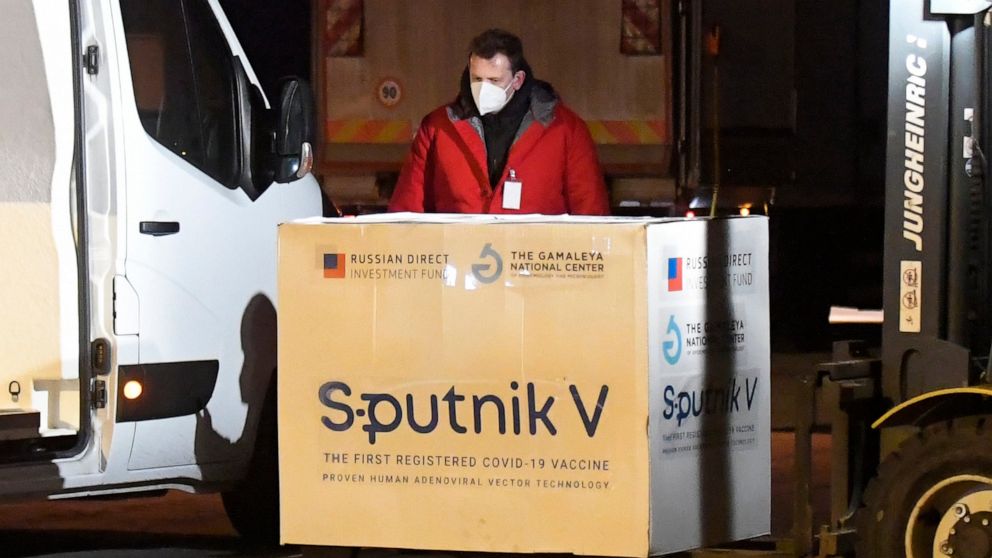EU regulator starts a review of Russia’s COVID-19 vaccine
MOSCOW — The European Medicines Agency has started a rolling review of Russia’s Sputnik V coronavirus vaccine, many months after it was first approved for use in Russia and after dozens of countries around the world have authorized it.
In a statement Thursday, the European regulator said the review is based on results from lab studies and research in adults, which suggests the vaccine may help protect against the coronavirus.
Despite skepticism about Russia’s hasty introduction of the vaccine, which was rolled out before it had completed late-stage trials, the vaccine appears to be safe and effective. According to a study published last month in the journal Lancet, Sputnik V is 91% effective and appears to prevent inoculated individuals from becoming severely ill with COVID-19, although it’s still unclear if the vaccine can prevent the spread of the disease.
With a global shortage of COVID-19 vaccines, some experts say boosting the use of vaccines made by China and Russia — which have not been as in demand as those made by Western companies — could offer a quicker way to increase the global supply. The pandemic has already infected over 115 million people, killing over 2.5 million of them, according to a tally by Johns Hopkins University.
The EMA has so far approved three COVID-19 vaccines for use across the 27-nation European Union: shots made by Pfizer-BioNtech, Moderna and AstraZeneca. It could license a fourth shot made by Johnson & Johnson at an expert meeting next Thursday.
The EMA has not set a date for when its expert group might meet to assess Sputnik V data but the rolling review aims to expedite the authorization process, which can typically take months.
Dr. Hans Kluge, the World Health Organization’s regional director for Europe, called the EMA announcement on Sputnik V “good news.”
“We desperately need to enlarge our portfolio of vaccines, so I see this as a very welcome development,” Kluge said.
In the meantime, dozens of countries have already authorized Sputnik V for use — including EU member Hungary — and many have agreed to purchase millions of doses of the shot.
Kirill Dmitriev, CEO of the Russian Direct Investment Fund that bankrolled the development of the vaccine, said Thursday that “vaccine partnerships should be above politics and cooperation with EMA is a perfect example, demonstrating that pooling efforts is the only way to end the pandemic.”
“Following EMA approval, we would be able to provide vaccines for 50 million Europeans starting from June,” Dmitriev added.
The European Commission, the EU’s executive arm, said Thursday it is not looking to add the Russian vaccine to its portfolio at this stage.
“No talks are ongoing between negotiation teams and the producers, or institutes, or companies or organizations behind the Sputnik vaccine,” said Stefan De Keersmaecker, the Commission’s health policy spokesman.
The RDIF has been pushing for the EMA to review Sputnik V for months, with Dmitriev first announcing an application to the European regulator in November. In January, the EMA met with the developers of the vaccine.
Although there was considerable scientific skepticism when Russia unrolled its vaccine without completing advanced trials, many doubts have since been assuaged with the publication of it latest research. Experts said Russia’s initial immunization campaign was marred by “unseemly haste, corner cutting and an absence of transparency.”
Sputnik V uses a modified version of the common cold-causing adenovirus to carry genes for the spike protein into the coronavirus to prime the body to react if COVID-19 comes along. That’s a similar technology to the vaccine developed by AstraZeneca and Oxford University.
But unlike AstraZeneca’s two-dose vaccine, Sputnik V uses a slightly different adenovirus for the second booster shot, a factor that some scientists say may account for its apparently high efficacy rate.
The World Health Organization is also considering whether or not to issue an emergency use approval for Sputnik V; officials last month were awaiting further details from its Russian developers. That approval would be essential for any Sputnik V vaccines to be used in the U.N.-backed COVAX program to try to distribute vaccines fairly to nations around the world, but COVAX has not yet signed any deals for Sputnik V.
Questions have been raised in the West over Russia’s eagerness to export its vaccine amid its comparatively slow domestic vaccine rollout — officials say nearly 4 million people, less than 3% of Russia’s population of 146 million, have received the shots so far.
“I must say we still wonder why Russia is offering theoretically millions and millions of doses while not sufficiently progressing in vaccinating their own people,” European Commission President Ursula von der Leyen said.
Kremlin spokesman Dmitry Peskov retorted that Russia’s vaccination campaign is going at “normal” rates, adding that the international demand for Sputnik V is “so high that it significantly exceeds (Russia’s) production capacity.”
The RDIF says it has received requests for 2.4 billion doses of the two-shot vaccine, enough to immunize 1.2 billion people, from over 50 countries. According to Prime Minister Mikhail Mishustin, Russia has so far produced just over 10 million doses.
——
Jamey Keaten in Geneva and Samuel Petrequin in Brussels contributed to this report.
Follow AP’s pandemic coverage at https://apnews.com/hub/coronavirus-pandemic, https://apnews.com/hub/coronavirus-vaccine and https://apnews.com/UnderstandingtheOutbreak
![]()


